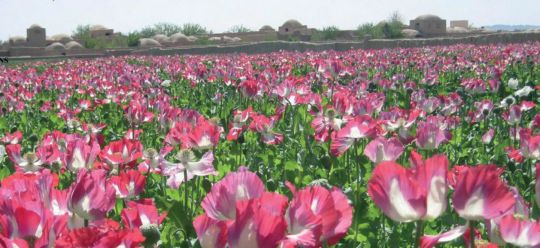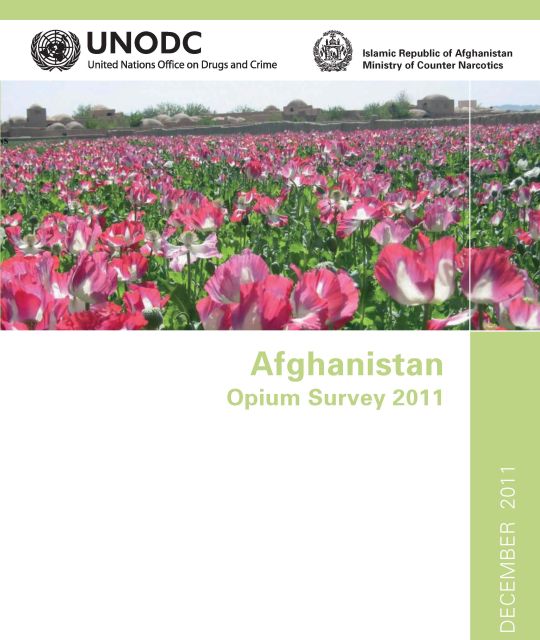Afghanistan: UN-backed survey shows sharp rise in opium production and prices
Afghanistan: UN-backed survey shows sharp rise in opium production and prices
 Poppy field in Afghanistan. Photo: UNODC
Poppy field in Afghanistan. Photo: UNODC
The price of opium in Afghanistan rose dramatically last year, according to a joint survey by the United Nations and the Government that was released today, which also shows that the farm-gate income from the narcotic probably amounted to over $1.4 billion, equivalent to nine per cent of the gross domestic product (GDP).
The 2011 Afghan Opium Survey, carried out by the UN Office on Drugs and Crime (UNODC) and the Ministry of Counter Narcotics, reveals a 133 per cent increase in the farm-gate value of opium compared with the previous year.
Export earnings from Afghan opiates may be worth $2.4 billion, equivalent to 15 per cent of GDP. “Opium is therefore a significant part of the Afghan economy and provides considerable funding to the insurgency and fuels corruption,” said Yury Fedotov, the UNODC Executive Director.
Almost 60 per cent of farmers surveyed last year said they were primarily motivated by the high prices fetched by opium poppy cultivation, which will continue to remain attractive if it reaps bumper profits, according to the survey, a preliminary version of which was released in October.
Compounding the problem was a simultaneous drop in the price of wheat. Gross income from opium last year was 11 times higher than that earned from wheat, the biggest difference in income since 2003.
In 2010 a poppy plant disease wiped out much of the opium yield and the resulting scarcity of fresh opium triggered a speculative rise in prices. While higher prices had been expected last year after opium yields returned to pre-blight levels, the 2011 values far exceeded expectations, according to the survey.
The gross per hectare income from opium cultivation ($10,700) therefore also reached levels not observed since 2003.
An estimated 90 per cent of the world’s opium comes from Afghanistan. The survey showed that poppy-crop cultivation spread over 131,000 hectares last year, seven per cent higher than in 2010. The amount of opium produced increased by 61 per cent, from 3,600 tons in 2010 to 5,800 tons last year.
“The Afghan Opium Survey 2011 sends a strong message that we cannot afford to be lethargic in the face of this problem. We thank the Government of Afghanistan for the leadership and dedication already shown, but a stronger commitment from a broad range of national and international partners is needed to turn this worrying trend around,” said Mr. Fedotov.
UNODC recently launched an ambitious regional programme for Afghanistan and neighbouring countries, which focuses on counter-narcotics, as well as a new country programme to support alternative livelihoods for opium poppy farmers.
###
Afghan opium prices soar as production rises
12 January 2012 – The full Afghan Opium Survey for 2011 points to a dramatic increase of 133 per cent in the farm-gate value of opium compared with 2010 (the summary findings of the survey were issued in September 2011). Released today by the Ministry of Counter-Narcotics of Afghanistan and the United Nations Office on Drugs and Crime (UNODC), the survey reveals that the farm-gate income generated by opium probably amounted to $1.4 billion, equivalent to 9 per cent of the GDP of Afghanistan in 2011.
Even more striking is the potential income derived from opium production. Export earnings from Afghan opiates may be worth $2.4 billion – equivalent to 15 per cent of GDP. Such vast sums cannot easily be earned in other ways. “Opium is therefore a significant part of the Afghan economy and provides considerable funding to the insurgency and fuels corruption,” said Yury Fedotov, Executive Director of UNODC.
Almost 60 per cent of farmers surveyed in 2011 said that they were motivated primarily by the high prices fetched by opium poppy cultivation, which will continue to remain attractive if it reaps bumper profits, according to the survey. Compounding the problem was a simultaneous drop in the price of wheat. In 2011, the gross income from opium was 11 times higher than that from wheat, the biggest difference in income since 2003.
In 2010, plant diseases wiped out much of the opium yield and the resulting scarcity of fresh opium triggered a speculative rise in prices. While higher prices had been expected in 2011 after opium yields returned to pre-blight levels, the 2011 values far exceeded expectations. The gross per-hectare income from opium cultivation ($10,700) also reached levels not observed since 2003.
Around 90 per cent of the world’s opium comes from Afghanistan. The survey showed that the area of land used for opium poppy cultivation in 2011 was 131,000 hectares, 7 per cent higher than in 2010. The amount of opium produced increased by 61 per cent, from 3,600 metric tons in 2010 to 5,800 metric tons in 2011.
“The Afghan Opium Survey 2011 sends a strong message that we cannot afford to be lethargic in the face of this problem. We thank the Government of Afghanistan for the leadership and dedication already shown, but a stronger commitment from a broad range of national and international partners is needed to turn this worrying trend around”, said Mr. Fedotov, referring to rising production.
UNODC recently launched an ambitious regional programme for Afghanistan and neighbouring countries that focuses on counter-narcotics, as well as a new country programme to support alternative livelihoods for opium poppy farmers. In addition, the UNODC-brokered Paris Pact, an initiative involving more than 50 States, provides a platform to promote coordinated measures to counter drug trafficking from Afghanistan. Next month in Vienna, the Governments of States members of the Paris Pact initiative will meet at the ministerial level to consider the next steps. “With the transition of responsibilities towards 2014 in mind, our message is clear. Counter-narcotics is not the exclusive domain of specialized units alone, but the shared responsibility of everybody concerned with security, stability, governance and development in Afghanistan and the wider region”, said Mr. Fedotov.
###
About UN Office on Drugs and Crime (UNODC)
UNODC is a global leader in the fight against illicit drugs and international crime. Established in 1997 through a merger between the United Nations Drug Control Programme and the Centre for International Crime Prevention, UNODC operates in all regions of the world through an extensive network of field offices. UNODC relies on voluntary contributions, mainly from Governments, for 90 per cent of its budget.
UNODC is mandated to assist Member States in their struggle against illicit drugs, crime and terrorism. In the Millennium Declaration, Member States also resolved to intensify efforts to fight transnational crime in all its dimensions, to redouble the efforts to implement the commitment to counter the world drug problem and to take concerted action against international terrorism.
The three pillars of the UNODC work programme are:
- Field-based technical cooperation projects to enhance the capacity of Member States to counteract illicit drugs, crime and terrorism
- Research and analytical work to increase knowledge and understanding of drugs and crime issues and expand the evidence base for policy and operational decisions
- Normative work to assist States in the ratification and implementation of the relevant international treaties, the development of domestic legislation on drugs, crime and terrorism, and the provision of secretariat and substantive services to the treaty-based and governing bodies
In pursuing its objectives, UNODC makes every effort to integrate and mainstream the gender perspective, particularly in its projects for the provision of alternative livelihoods, as well as those against human trafficking.
Overview of the technical assistance provided by UNODC
The international community confronts a host of menaces, including illicit drugs, threats to security and health and new and emerging crimes. As Governments and other development partners increasingly look to UNODC for specialized assistance and expertise, the Office has expanded it scope and volume of work to provide comprehensive and coherent responses to these challenges.
UNODC has released a new Menu of Services published in October 2010, which provides a detailed overview of how clients can access targeted assistance or the range of publications and online tools available
UNODC can help in the following areas:
Organized crime and trafficking
UNODC helps Governments react to the instability and insecurity caused by crimes like the smuggling of illicit drugs, weapons, natural resources, counterfeit goods and human beings between countries and continents. It is also addressing emerging forms of crime, such as cybercrime, trafficking in cultural artefacts and environmental crime.
Corruption
Corruption is a major impediment to economic and social development, UNODC partners with the public and private sectors, as well as civil society, to loosen the grip that corrupt individuals have on government, national borders and trading channels. In recent years, the Office has stepped up its efforts to help States recover assets stolen by corrupt officials.
Crime prevention and criminal justice reform
UNODC promotes the use of training manuals and the adoption of codes of conduct and standards and norms that aim to guarantee that the accused, the guilty and the victims can all rely on a criminal justice system that is fair and grounded on human rights values. A strong rule of law will also instill confidence among citizens in the effectiveness of the courts and the humanness of the prisons.
Drug abuse prevention and health
Through educational campaigns and by basing its approach on scientific findings, UNODC tries to convince youth not to use illicit drugs, drug-dependent people to seek treatment and Governments to see drug use as a health problem, not a crime.
Terrorism prevention
On this issue, UNODC is moving towards a more programmatic approach that involves developing long-term, customized assistance to entities involved in investigating and adjudicating cases linked to terrorism.
###
> United Nations (UN).
 The United Nations was established on 24 October 1945 by 51 countries committed to preserving peace through international cooperation and collective security. Today, nearly every nation in the world belongs to the UN: membership totals 192 countries.
The United Nations was established on 24 October 1945 by 51 countries committed to preserving peace through international cooperation and collective security. Today, nearly every nation in the world belongs to the UN: membership totals 192 countries.
When States become Members of the United Nations, they agree to accept the obligations of the UN Charter, an international treaty that sets out basic principles of international relations. According to the Charter, the UN has four purposes:
- to maintain international peace and security;
- to develop friendly relations among nations;
- to cooperate in solving international problems and in promoting respect for human rights;
- and to be a centre for harmonizing the actions of nations.
###
* The above story is adapted from materials provided by United Nations (UN)
** More information at United Nations (UN)





















